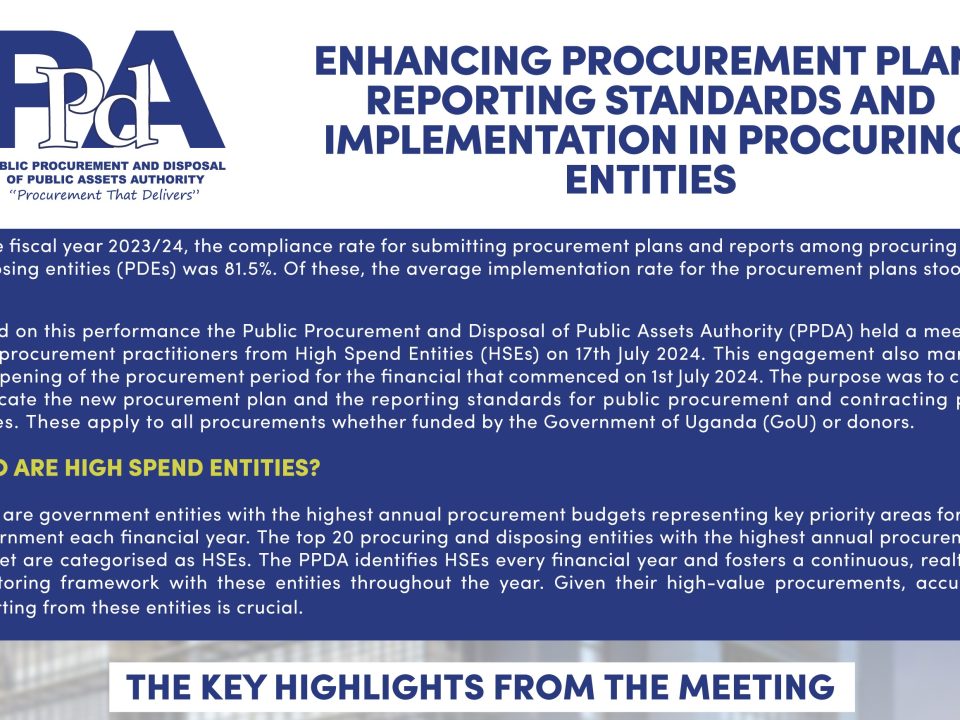Here is why accounting officers are critical in curbing private sector corruption.

Completing government projects on time will spur national development – By Cris Magoba
July 27, 2023
Here is how Beneficial Ownership declaration promotes transparency in public procurement
January 19, 2024Here is why accounting officers are critical in curbing private sector corruption.
By Benson Turamye
There is a popular phrase, in public discourse, to wit; ‘the buck stops here’ or ‘where does the buck stop’. Historically, this phrase, (or idiom), was reportedly coined by Harry Truman the 33rd president of the United States, (1945 to 1953).
The main thrust of this idiom is that a person in a position of responsibility is liable for whatever happens in their docket and should not try to pass the responsibility on to someone else. In government, this can never be truer than when referring to the accounting officer (AO).
The AO is that person appointed by the Permanent Secretary/ Secretary to the Treasury under Section 11 of the Public Finance Management Act, 2015 (PFMA). The most widely known AOs are permanent secretaries for ministries, chief administrative officers (CAO) for districts and town clerks for cities and municipalities. There are also other accounting officers, mainly the heads of government institutions like statutory agencies, commissions and authorities which are self accounting and semi-autonomous from the parent ministries.
In line with Section 45 of the PFMA, AOs are the ultimate authority in terms of utilization of public resources in their institutions. This is irrespective of the fact that there are always other government officials who are more senior than the AO, including ministers.
According to the PFMA, the AOs are charged with controlling and ensuring proper use of monies appropriated to their institutions and authorizing commitments on behalf of their institutions. Furthermore, the PPDA Act in section 26 stipulates that the Accounting Officer shall have overall responsibility for the execution of the procurement and disposal process.
Even when they delegate responsibilities, say when they are on leave, the law provides that an AO shall still be personally accountable for a function or responsibility that is delegated.
In the realm of public procurement and public assets disposal, (which is the essence of this article), the buck indeed stops with the AO. When a procurement process goes according to plan, then the AO gets credit. It also follows that when things go haywire, the AO is answerable because the buck stops with them even when we know that there are a multiplicity of stakeholders involved who may mess up the processes. When a government health centre under construction collapses, the contractor may take the blame, but ultimately the AO will have questions to answer. And when a similar facility is flawlessly constructed to the satisfaction of all stakeholders, the AO should, and will take the plaudits.
The main gist of this article however is not just about successful or unsuccessful public procurements. It is also about how the AO is an invaluable ally in curbing private sector corruption.
When we talk of corruption, the main conclusion by the ordinary citizen is dishonest or fraudulent conduct by government officials. Granted. Corruption by public officials is still a big challenge undermining government efforts to deliver services to the population. However, unknown to many, there are other forms of corruption orchestrated by the private sector players, notably bidders and contractors.
In pursuit of our mandate we, as PPDA, encounter many cases of illicit, underhand and ultimately criminal acts indulged in by our private sector players
The PPDA Act under section 94 mandates the Authority to suspend a provider from engaging in any public procurement or disposal process. The grounds for such suspension may rise from the recommendation by an AO of a procuring and disposing entity or after investigations by the PPDA establishes breaches of the Code of Ethics.
And these breaches are prevalent. They include forging of bid securities, performance bonds. A bid security is a form of monetary guarantee that government agencies requires from a bidder or tenderer to safeguard against the withdrawal of their bid in the procurement process. This is majorly to eliminate unserious persons whose participation in the procurement process may unduly lead to delays and loss of valuable time.
A performance bond, on the other hand is a financial guarantee (and typically backed by banks) to the government, against the failure of the contractor to meet their obligations when they are awarded contracts. Contractors issue performance bonds to government as an assurance that they are up to the task of the contracts they have won.
It is this regard that we must hail the AOs because they have done a lot to bring to the attention of the PPDA numerous forgeries. But it is not yet time to rest on our laurels. We need concerted effort to fight private sector-led corruption from the public procurement and asset disposal system.
The PPDA does not derive any gratification from suspending any firms from doing business with government. In fact, the Authority commits a lot of time and efforts in building the capacity of the contractors, especially local contractors, to enable them handle high end contracts that have hitherto been awarded to foreign firms.
However, building capacity and empowering local firms should not be at the expense of ethics and the law. The PPDA Act and other legal instruments in this country enjoin all players in public procurement and disposal processes to adhere to ethics.
The writer is the Executive Director of the PPDA.




